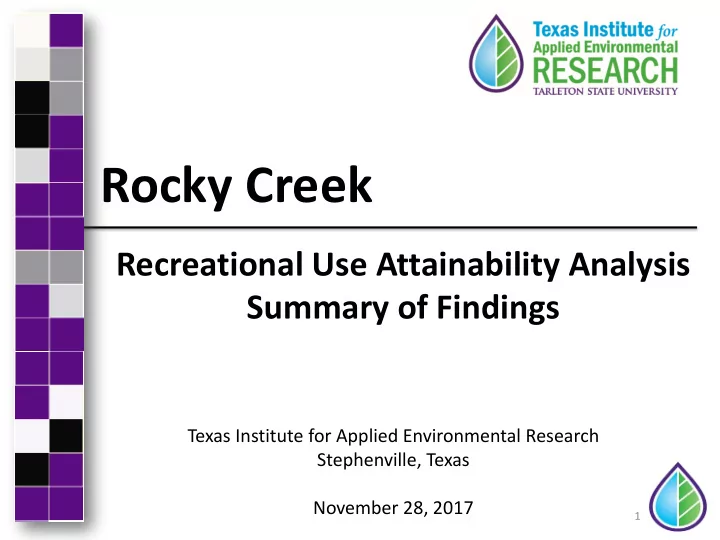

Rocky Creek Recreational Use Attainability Analysis Summary of Findings Texas Institute for Applied Environmental Research Stephenville, Texas November 28, 2017 1
Project Partners • Texas Commission on Environmental Quality (TCEQ) • Texas Water Resources Institute (TWRI) • Texas Institute for Applied Environmental Research (TIAER) 2
Who is a Stakeholder? • Landowners • Citizens • Citizen Groups • Local Representatives • Local Governmental entities – Cites – Counties • Non-Governmental Organizations 3
Importance of Being a Stakeholder • Stakeholders: –Make and implement decisions –Are affected by the decisions made –Participate in the implementation planning process 4
Why we are here • Texas 303 (d) List of Impaired Water bodies – Developed by TCEQ to summarize the condition of the state’s surface waters, including concerns for public health, fitness for use by aquatic species and other wildlife, and specific pollutants and their possible sources 5
Bacteria Impairment • Rocky Creek is not meeting the water quality standard for primary contact recreation • Due to elevated levels of bacteria, E. coli • Requires action to meet the standards that are set by the State of Texas and EPA – Geometric mean should not exceed 126 cfu/ 100ml 6
Impaired Stream Segments • Rocky Creek (1602B) – 2014 Texas Water Quality 303(d) List • Bacteria – Current Geometric mean = 222 cfu/ 100mL 7
8
TCEQ Water Quality Monitoring Stations Site Description Rocky Creek immediately upstream of the Lavaca River confluence on CR 387 and approximately 5.3 miles south of Hallettsville on US 77 – TCEQ 18190 9
RUAA • One method of removing Rocky Creek from the impaired list for bacteria – Assess if the recreational standard is appropriate • Recreational use attainability analysis (RUAA) 10
Purpose of RUAA • To determine if primary contact recreation is the correct use or if another recreational use category may be more appropriate 11
RUAA Use Categories • Primary Contact Recreation – 126 cfu/100 mL – Activities that are presumed to involve a significant risk of ingestion of water • Such activities are – wading by children, swimming, water skiing, diving, tubing, surfing, and whitewater activities: kayaking, canoeing, and rafting. • Secondary Contact Recreation 1 – 630 cfu/100 mL – Activities that commonly occur but have limited body contact incidental to shoreline activity • Wading by adults, fishing, canoeing • Activities are presumed to pose a less significant risk of water ingestion that primary contact recreation but more than secondary contact recreation 2. 12
RUAA Use Categories • Secondary Contact Recreation 2 – 1030 cfu/100 mL – These activities occur less frequently than secondary contact recreation 1 due to physical characteristics of the waterbody or limited public access. • Noncontact Recreation – 2060 cfu/100 mL – Activities that do not involve a significant risk of water ingestion, such as those with limited body contact incidental to shoreline activity, including birding, hiking, and biking 13
RUAA Components • Historical Information Review – to document past recreational uses • Interviews – to obtain feedback on current and past recreational uses from stakeholders • Field Surveys – to document current waterbody conditions and uses 14
Survey Dates for Rocky Creek • First RUAA Survey – Conducted May 16, 2017 • Summary – Thick vegetation & steep banks making it difficult to access water – No direct recreation observed – Limited access at 6 road crossings – Multiple poisonous snakes spotted throughout the stream • Second RUAA Survey – Conducted July 25, 2017 • Summary – Thick vegetation & steep banks making it difficult to access water – No direct recreation observed – Limited access at 6 road crossings – Multiple poisonous snakes spotted throughout the stream 15
Rocky Creek Photographs RC01 Downstream at 150m – RC01 Downstream at 150m second survey 16
Rocky Creek Photographs RC04 Right Bank at 0m – RC03 Upstream at 300m second survey 17
Rocky Creek Photographs RC11 Upstream at 150m – Access gate to RC07 second survey 18
Rocky Creek Photographs RC15 Downstream at 300m – RC13 Right Bank at 0m second survey 19
Rocky Creek Photographs RC17 Downstream at 300m – RC16 Upstream at 150m second survey 20
Next Steps • Interviews: on-going – Collecting feedback on current and past recreational uses of Rocky Creek Interview forms can be requested from TIAER • Completion of the final technical report – To be distributed Spring 2018 21
Contact Information Leah Taylor Email: ltaylor@tiaer.tarleton.edu Office Phone: 254.968.0513 Jeff Stroebel Email: jstroeb@tiaer.tarleton.edu Office Phone: 254.968.9556 22
Questions? Project Website: http://matagordabasin.tamu.edu/ Funding for this project is provided by the Texas Commission on Environmental Quality Leah Taylor Texas Institute for Applied Environmental Research ltaylor@tiaer.tarleton.edu (254) 968-0513 23
Recommend
More recommend